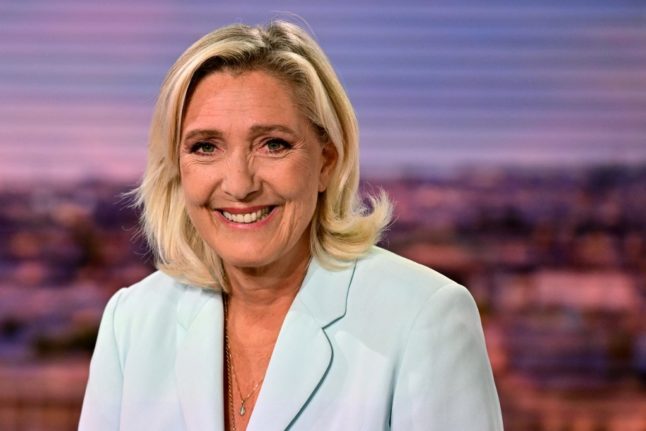The remaining money – €6.1 million of the original €9.4 million – was paid back “in advance” to the Russian firm Aviazapchast, which had bought the debt, the party said in a statement Tuesday.
Rassemblement National (RN) officials hope getting out from under the debt can end attacks like Presidential Emmanuel Macron’s last year, when he accused their candidate Marine Le Pen of being “dependent on the Russian regime” and President Vladimir Putin during the 2022 election debate.
Le Pen is “talking to her banker when she talks to Russia,” Macron said at the time.
Ahead of the 2022 campaign, the party had to hastily shred election leaflets that included a photo of Le Pen with Putin, after the Russian invasion of Ukraine.
The loan “is used as an argument by my opponents, in my opinion unfairly, and I don’t plan on giving my opponents any arguments,” RN chief Jordan Bardella told daily Le Monde.
Winning dozens of seats in parliamentary elections following Macron’s re-election has given the RN access to millions more in public funding, allowing it to repay the Russian debt before the 2028 deadline.
Its announcement of the repayment came the day after Le Pen said she was the party’s “natural candidate” to run for president again in 2027, when Macron will have reached his two-term limit.
READ ALSO Why France is already talking about the 2027 election
The loan, originally from the First Czech-Russian Bank (FCBR), kept the party afloat from 2014, when it claimed French lenders were refusing to extend credit.
Later bought by a Russian car rental firm after FCBR went bust, the debt ended up with Aviazapchast an aircraft components firm owned by former Russian soldiers.
The RN last year opened a parliamentary inquiry into foreign interference in French politics, in a bid to clear itself of allegations it was acting in Russia’s interest.
But the committee’s final report found that the RN was a “relay” for Russia in French politics, highlighting its “alignment” with Kremlin messaging when Moscow claimed to have annexed the Crimean peninsula from Ukraine in 2014.
The party has also opposed French aid for Ukraine since Russia’s invasion last year, and did not vote when the French parliament approved bids by Finland and Sweden to join NATO.
Marine Le Pen “has given no sign of a real break with the Kremlin”, public broadcaster FranceInfo commented in an editorial.
“If tomorrow she continues to take pro-Russian positions, (she) will at least prove that it’s not out of self-interest, but a real political choice.”



 Please whitelist us to continue reading.
Please whitelist us to continue reading.
Please stop being so political.